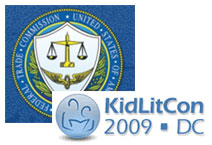 Shouldn’t it be a crime to call certain books literature—even the popular kind of lit? A certain side of me applauded on hearing that the FTC would force bloggers to reveal the receipt of review copies of the titles they reviewed. Next? Truth in reviewing provisions?
Shouldn’t it be a crime to call certain books literature—even the popular kind of lit? A certain side of me applauded on hearing that the FTC would force bloggers to reveal the receipt of review copies of the titles they reviewed. Next? Truth in reviewing provisions?
But where to draw the line? Do we really want the feds policing the free press, and I don’t just mean “free” in the freebies sense? Aren’t free review copies part of the game? Don’t recipients still feel free to pan titles?
Well, we worrywarts are in luck, going by our friends at GalleyCat, which, via the GalleySmith blog, picked up info from a kidlit converntion.
The FTC’s Mary Engle now seems to be saying that if you’re an independent reviewer, as opposed to the participant in a marketing program or someone otherwise compromised, you’ll be safe. Not to stretch things. If you’re an Amazon affiliate and you hotlink to a page of a reviewed book and you get revenue from this arrangement, then you might not be so safe. I’m not sure. But at least this malarkey about bloggers opening up used bookstores or whatever isn’t going to apply. Thanks, FTC!
































Considering how little most bloggers (and podcasters like me) make from affiliate sales, the whole thing is pretty ridiculous. And even if they/we were to resell the review copies they/we get (which I don’t do), again, a lot of work for very little money.
So I’m encouraged by this latest info coming out of the FTC. Seems like they’re trying to keep things in perspective.
I agree with Paula above. I sometimes write book reviews and then add a link to the book using my Amazon affiliate account. For all the work I put into my blog, I make pennies (if that) for my efforts. Hopefully the FTC realizes they have a lot bigger fish to fry. Sounds like their on the right track though.
re books and literature, a certain someone who writes novels,, tells me in email and on his blog:
“Interesting too is the premise that reading should serve some purpose (fostering critical thinking was mentioned; indeed, an increase in logical-mathematical ability is often observed after absorbing Dan Brown’s magical offerings; a lifetime of reading DeLillo has left me with quite amazing powers of deduction and abstraction). We read — those of us who do — because we enjoy. That’s all. Again, whatever the medium. If you don’t enjoy, you surf away. Simple as that. And now we simply have more doohickeys, moving images and sound and all, that allow such surfing, so that those who don’t enjoy reading lengthy exposes or narratives don’t have to. They were just pretending anyway, or else long lost to Harlan Coben. Is there anything tangible to suggest that prolonged exposure to Henry James makes one, well, a better human? (Whatever that may be?)
To conjecture, I would be surprised if literature is going the way of the dodo. What I do predict (not a hard prediction to make, methinks) is that literature is going the way of the opera. That process started long before computers and kindles landed in every lap. Bombing Bezos’s hardware factories — or Sony’s, or Nintendo’s — won’t do a thing for humankind. Would it?
Relax. It’s called change. We humans have survived change for about a million years now. And if we don’t, well what of it?”
“…literature is going the way of the opera.”
Danny, that’s a great quote! Can you tell us who said that (so I can give proper credit)?
Raja99, yes, Paul Verghaegen, a novelist in Atlanta at Georgia Tech Uni, orignally from Belgium, very very sharp guy, see his blog too.
http://verhaeghen.blogspot.com/2009/10/were-all-luddites-again.html
— danny
see this too, from me, for HUMOR: re KINDLING as a verb:
and my HOGWASH statement here: serious:
http://zippy1300.blogspot.com/2009/10/hogwash-statement-by-danny-bloom.html
http://www.urbandictionary.com/define.php?term=kindle